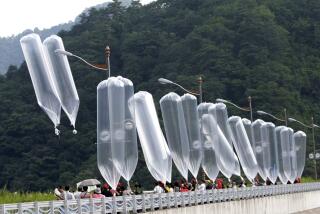Can Capitalism Survive the IMF?
- Share via
Kim Dae Jung, the liberal newly elected president of South Korea, has his work cut out for him. In addition to having to pay to keep 37,000 U.S. combat troops in his country with a Korean currency that has lost half its value in U.S. dollars, his civil war antagonist, Kim Jong Il in North Korea, is trying to exploit South Korea’s economic woes.
On Tuesday, the New York Times carried a full-page, color ad depicting Kim Jong Il and announcing that he had emerged “as the Lodestar for Sailing the 21st Century.” While South Korea has just been forced to accept what it considers to be humiliating conditions from the International Monetary Fund in exchange for a financial bailout, North Korea was saying, in effect, to Koreans everywhere: “If you don’t like what’s happening in the South, we are the true patriots ready to receive you with open arms.” Never mind that North Korea also has received its share of bail-outs this past year, of rice and other food for its starving population. But there were no humiliating strings attached to that aid, least of all one forbidding them the waste of $85,000 on a self-congratulatory newspaper advertisement.
Koreans on both sides of the DMZ are a proud, nationalistic people. North Koreans insist that they were more fierce in resisting Japan during World War II, and this is stressed several times in their ad. Kim Jong Il is described as being born “in a secret camp of anti-Japanese guerrillas” to “young General Kim Il Sung, who was leading anti-Japanese struggles to win Korea’s independence, and Madame Kim Jong Suk, who was an anti-Japanese woman fighter.” It may have struck some readers as odd, therefore, that the ad was placed by people living in Japan. But Japan is home to some 800,000 Koreans, many of whom support North Korea with financial remittances and other means. Japan, which was the hated colonial overlord of Korea for 40 years before World War II, and which still treats even second- and third-generation Koreans born in Japan as virtual outcasts, has long turned a blind eye to these remittances and other forms of support for North Korea. This is one reason why the United States, in the event of another conflict on the Korean peninsula, would be foolish to suppose that Japan would actually honor the Japan-U.S. Security Treaty by becoming involved in any military way.
But North Korea clearly did not place this ad in order to incite us or the South Koreans to war. Quite the opposite. This is a bit of gloating by some noncapitalists over the misfortunes that have befallen their capitalist brothers. It should also serve as a warning to the U.S. that the IMF’s arrogant demands that Asian economies such as South Korea, Thailand and Indonesia refashion themselves to look more like the West may backfire in quite spectacular and unexpected ways.
In the mid-1980s, the IMF imposed similar conditions on Vietnam, which rapidly became the investment haven of choice for Korean companies making Nike shoes and other apparel that used to be made in South Korea. If the South Korean economy is now forced to contract severely, it is sure to take down with it many of its investments in places like Indonesia, China and Vietnam.
The South’s new president-elect, Kim Dae Jung, is a great Korean patriot. Previous military regimes have tried to assassinate him. He also represents the people of southwestern Korea, who have long been discriminated against politically and economically and who were the victims of the American-condoned massacre of protestors in Kwangju in 1980.
If Kim now succeeds in mobilizing the nationalism of the South Koreans to take only from the IMF what is compatible with Korean culture, he will go down as the best president since Park Chung Hee. If he should also invite the American troops to go home and negotiates a real modus vivendi with his starving but equally proud compatriots to the North, he may become the greatest Korean politician of all time.
More to Read
Sign up for Essential California
The most important California stories and recommendations in your inbox every morning.
You may occasionally receive promotional content from the Los Angeles Times.













